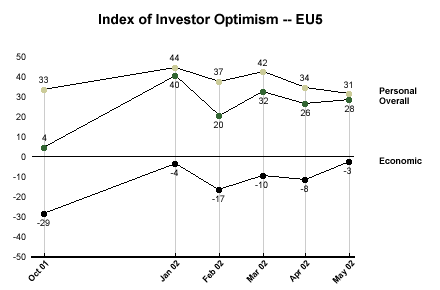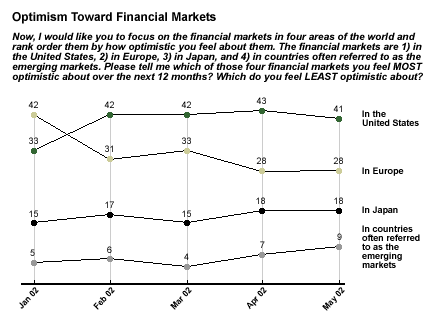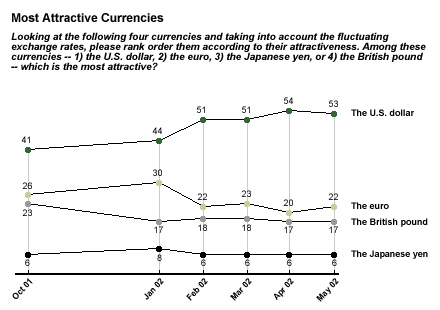Over the past several months, the value of the U.S. dollar has been in a steady decline. At the end of January 2002, it took about 86 cents to buy one euro. By the end of the first week of June, that figure had risen to nearly 95 cents. Will this decline continue in the months ahead? Efforts by the Japanese to keep the dollar's decline in check are temporary measures at best, and it seems clear that the United States is not interested in intervening in the currency markets. Of course, the recent turmoil in the stock market hasn't helped.
A falling U.S. dollar is generally perceived as good for U.S. exports but bad for inflation. Still, the real reason for concern about the dollar has to do with this nation's financial markets. If the world's investors see their currency risk getting so high that it negates the benefits of investing in the United States, then U.S. stock values could decline as interest rates increase. In short, a plunging dollar would be a bad prescription for an already struggling U.S. economy that needs more capital investment, much higher corporate profits and an extended period of low interest rates.
Based on what European investors are telling us in the most recent Gallup/UBS Index of Investor Optimism -- EU5 poll, I don't see the dollar plunging in the months ahead. I think that investors around the world still see the U.S. dollar as the place to be when political and economic uncertainties dominate the world's markets. I don't see these uncertainties disappearing anytime soon, nor do I see investors fleeing to another currency as a safe haven.
Optimism Among European Investors
New Gallup/UBS Index of Investor Optimism -- EU5 poll data (May 1-16)* show European investor optimism essentially unchanged in May (28) from April (26). The EU5 Index is now significantly below its January 2002 high of 40, but also remains significantly above its October 2001 benchmark low of 4.
In May, nearly half (47%) of EU5 investors say that the slowdown of the European economy has bottomed out -- up from 40% who said so in April. More positively, 60% of EU5 investors say they are somewhat or very confident that the European economy will be in recovery six months from now.

European Investors Favor the United States
While an upturn in the European economy would certainly be positive for the U.S. markets, European investors' views toward the U.S. financial markets are of even greater importance. For the past four months, about four in 10 EU5 investors have said that they are most optimistic about the performance of the U.S. financial markets over the next 12 months. Between a quarter and a third of EU5 investors have said that they are most optimistic about the performance of the European financial markets over the same period. Fewer than one in five EU5 investors say they are most optimistic about the Japanese financial markets, while about half that number -- fewer than one in 10 -- are most optimistic about the emerging markets.

Even as the U.S. dollar has declined, more than half of EU5 investors have been saying that they find it to be the most attractive currency. Fewer than one in of four say they find the euro or the British pound the most attractive, while only about one out of 20 find the Japanese yen the most attractive.

In May, 58% of EU5 investors said that they are somewhat or very optimistic about the euro's introduction and its effects on the European economy -- down slightly in recent months but still very positive. More importantly, only 19% of EU5 investors think that the euro will be somewhat or much stronger against the U.S. dollar a year from now, while 36% believe it will be somewhat or much weaker against the U.S. dollar. About four in 10 think the value of the euro relative to the U.S. dollar will be about the same a year from now.
*Results for the Index of Investor Optimism -- EU5 are based on interviews with approximately 200 investors each in France, Germany, Great Britain, Italy, and Spain conducted May 1-16, 2002. For results based on a total sample of approximately 1,000 investors, one can say with 95% confidence that the margin of sampling error is ± 3%. In addition to sampling error, question wording and practical difficulties in conducting surveys can introduce error or bias into the findings of public opinion polls.
